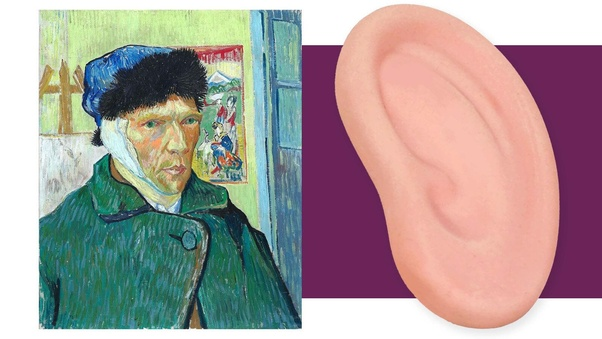Great art cannot be taught. If you disagree, you probably don't know Vincent Van Gogh is a prestigious artist. As a matter of fact, van Gogh never received any official training and didn't begin painting until he was 27year old. Although Van Gogh was greatly influenced by Japanese woodblock prints, he also found inspiration in Dutch genre painting and the realism of Millet and his contemporaries.
Plagued by psychiatric illness throughout his life, van Gogh committed suicide in 1890. Evidence suggests that he had manic depression, a chronic mental illness thought affects many creative people. Although treatment with lithium carbonate is now available, the medicine also dampens creative abilities.

Vincent van Gogh was suffering from mental disorders. Amputation of his ear in 1889 to draw it correctly! But how many innumerable "Vincents" tossed and turned in the darkness, searching for their "ears," where we can never see in our lives. Yes! As of today, it's 2023, and we're still talking about Van Gogh.
On 27 July 1890, in a field near Auvers, Vincent shot himself in the chest with a revolver. He died two days later, with his brother Theo at his bedside. Suicide or Murder?
Although little is known about how Vincent died, art historians have long assumed that he committed suicide, a widely accepted "truth" for the mysterious death of the then unknown and now iconic artist. The origins and veracity of this suicide narrative are still hotly debated among van Gogh scholars today.
The official cause of death for van Gogh was a self-inflicted gunshot wound, and it was assumed that he committed suicide. However, several inconsistencies in the story raised concerns about the true nature of his death. For one thing, van Gogh was a well-known hunter who was likely familiar with firearms. He also had a history of mental illness, but he had been improving in the weeks before his death. Furthermore, when he was discovered, he had a letter in his pocket, indicating that he had future plans.

Furthermore, several eyewitness accounts from the time of his death suggest that he did not commit suicide. According to one account, a local farmer named Rene Secretan was seen in the fields near Auvers-sur-Oise on the day of the shooting and was known to own a gun. Secretan is thought to have harbored a grudge against van Gogh as a result of a previous altercation. The fact that van Gogh had previously received death threats and was known to carry a gun for protection lends credence to this theory.
Scientific examination of van Gogh's painting materials, letters, and belongings has also called the suicide theory into question. The analysis revealed that the artist's system contained a high level of lead, which can cause symptoms similar to those of mental illness, such as depression and manic behavior. This could have accounted for van Gogh's erratic behavior and mental instability.
Who shot Vincent van Gogh?
While we will never know for sure who shot the beloved painter, we are almost certain it was not Vincent himself. The first thing to look for in any gunshot death is possible motives, including those of the person who died; however, Vincent was just getting discovered, on fire with creativity, in the most prolific period of his career, having just ordered paints and supplies. To top it all off, no suicide note was ever discovered, which was surprising for a man who enjoyed writing letters. He had only recently written upbeat letters to his brother.
Okay, end of story. To this day, the legendary Van Gogh is still circulating in a suicidal ending. If Van Gogh wasn't an artist, would the story still exist? In other words, whether art was the real killer of Van Gogh?
“In spite of everything I shall rise again; I shall take up my pencil which I have forsaken in my great discouragement, and I will go on with my drawing.” Vincent van Gogh
Vincent van Gogh - the starving artist who only sold one painting, Vincent the insane man who severed his left ear, Vincent the wild genius — was so intense that young children peered through his windows and threw objects at him while he painted. Vincent, the tortured, was too frail for this world.
In many ways, van Gogh's life was heartbreaking for him. From a young age, he felt unloved and alienated by his parents. He battled illnesses and depression. He frequently ate little and neglected his health as his financial situation. Many of his family members saw him as a failure. He was never able to find lasting romantic love. His brother supported him for the majority of his artistic career. With his drinking and misdeeds, he once alienated the people of Arles to the point where thirty people petitioned the mayor to commit him to an asylum. His death at a young age, whether by suicide or murder, bookended a tragic life story and sealed his fate as one of history's most tragic figures.
Never feel sorry for Vincent van Gogh. He had flaws and failures, but where he succeeded, he succeeded spectacularly. Even so, if you were a parent, would you still want your kids to become Van Gogh today?
If the price of success is mental illness, then a happy life may be the meaning of success. We love Van Gogh because his art healed many people's childhood, and because of this we cherish the good life even more.

Sofia Forsberg
11:13 AM
Monday, Oct 23, 2023
Stockholm, Sweden
Artpendix Press

Comentarios